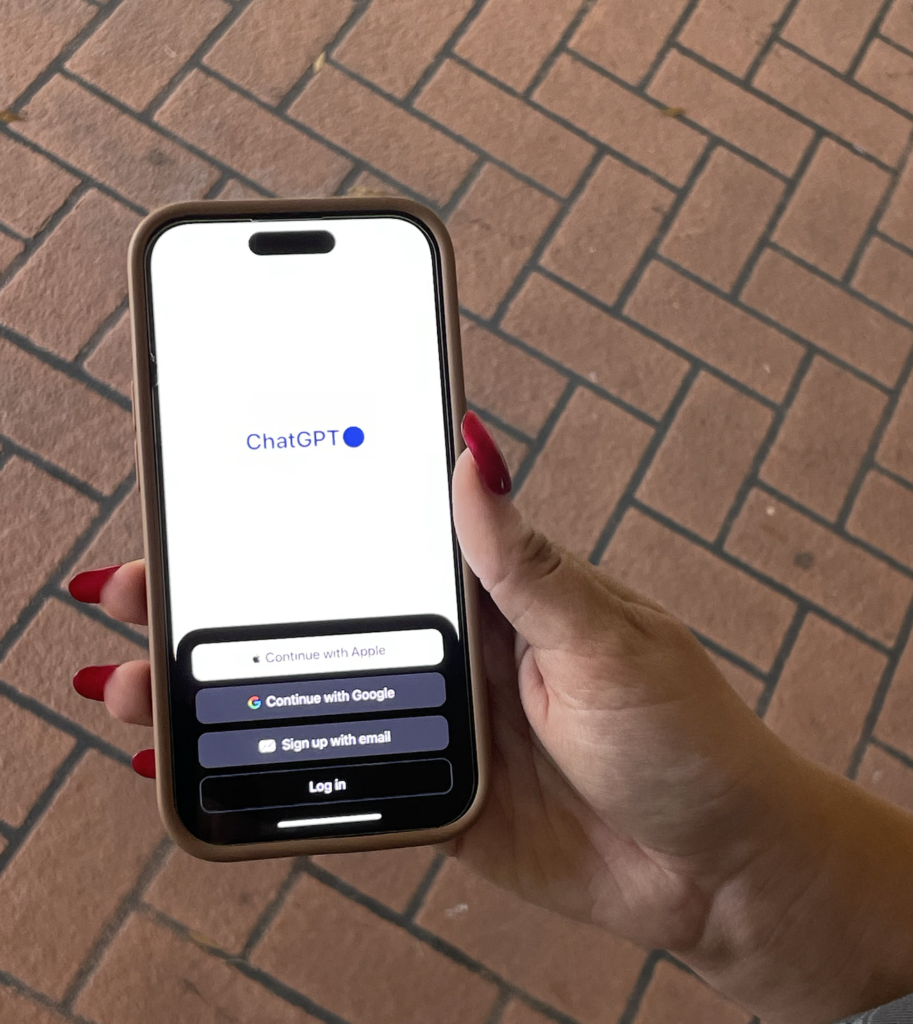
personal projects, like ideas for her short stories. | Photo by Southern Staff
Dylan Olive
News Editor
Students and professors are navigating AI usage in the classroom after a skyrocket in popularity with the technology’s release last year.
Released on Nov. 30, ChatGPT—which stands for Chat Generative Pre-trained Transformer— is an AI chatbot developed by OpenAI that uses a large language model (LLM) to have conversational-like generated responses. It creates responses to any question or request. In less than 10 months, the program has amassed more than 100 million users.
Students quickly discovered ChatGPT can be used as an academic resource when completing coursework. In a survey conducted by Intelligent.com in May, it was found that 30% of undergraduate and graduate students used AI in the 2022-2023 school year. When asked for their reasoning, respondents said the following: “good outlines and assists in organizational skills,” “It’s free,” “It collects specific information which saves time in researching” and “ease of use and simplicity.”
Ethical concerns over the technology in educational institutions have arisen, with the argument that some students are potentially submitting work that is AI-generated and submitting it as their own. Or, that students will solely depend on it to get higher grades than they would have if they did submit their own original work.
Other concerns stem from ChatGPT’s tendency to not be correct. Since its job is to generate a response based off its understanding of the question/phrase, it is not always correct because it has the “incapability to understand the underlying context of the question being asked,” researchers Samia Kabir, David Udo-Imeh, Bonan Kou and Tianyi Zhang found.
There are professors and students at FSC who are adapting to AI and integrating it into coursework, while others are opting out. Senior psychology major, Natalie Roth, said she doesn’t use AI or support its usage inside of academics, though believes it can be a beneficial tool if used correctly.
“There can be a downfall, it increases the risk of plagiarism which can lead to being kicked out of school,” Roth said. “I understand that it can help with writer’s block or provide support in specific questions, but when I do my research papers I prefer to be knowledgeable of every inch of my paper, I want to be the one who has taken the time to research and write the paper.”
Wendy Kiesewetter, senior Graphic Design major, says that she sometimes uses AI to help with personal projects, like ideas for her short stories. However, she believes that AI is “all of the Internet chewed up and spit out again,” and so people shouldn’t rely on it, especially in fields where you are expected to have your own unique voice and creativity.
Dr. Roberson, the Department Chair of Computer Science, supports using AI as long as it is used correctly—as a “tool”—and so as the student proves they understand the material of the assignment. Roberson has already started incorporating aspects of AI into assignments in one of his web development classes.
“There are ways I can integrate it into the classroom and give them a better experience,” Roberson said. “I’m trying to look at it on the positive side, where can I use this to improve student learning.”
At AI’s current state, Roberson believes it can have “the potential to be helpful for people in doing their jobs,” but believes that it has the potential to be harmful for fields like creative writing and copy. He expects the technology to plateau in the next few years and believes a killer-robot world like “The Terminator” is still far away.
“I think this gives educators a chance to reflect on how we assess students,” Roberson said. “We’ve had issues with things like Chegg and sites where someone can write a paper for them, but the convenience and ease of it make it interesting, but this has always been an ongoing issue with teaching and education.”
Dr. Durland, Associate Professor of Marine Biology, encourages students to use AI to explore questions and topics, especially for challenges students might be facing relating to course material. As long as her students write everything in their own words, she supports the use of it as it “helps facilitate understanding and learning.”
“The way I see it, if they are spending the time to use AI to answer questions it gets them thinking about the subject,” Durland said. “Then if they have to reword it or, better yet, have an actual conversation with AI to further clarify what they need to know, the students are engaging in a learning process and probably retaining some of the information.”
The Biology department is “in a unique position,” said Durland, as faculty want to discourage cheating and plagiarism while wanting to support engaged learning. Some faculty are banning AI in the classroom entirely while others are adding it to assignments, according to Durland.
AI has begun affecting various areas of life, education being one of them. While AI in education is still in uncharted territory, the use of it in FSC classrooms is currently regulated by the professor.




